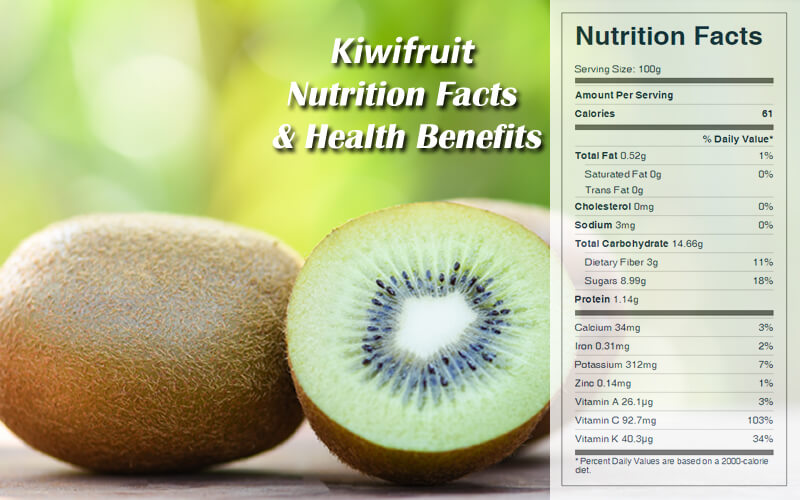Kiwifruit Nutrition Facts & Health Benefits
Kiwifruit is a popular fruit which is accepted by most people for its nourishment. This little fruit with the shabby fur coat is a treasury of nutritional riches.Here are the nutrition facts and health benefits of kiwifruit.
Green kiwifruit are 83% water and 15% carbohydrates, with negligible protein and fat. It is particularly rich in vitamin C and vitamin K and has a moderate content of vitamin E. Gold kiwifruit has similar nutritional value but higher vitamin C content.

One medium raw kiwifruit provides 46 calories, 11.3 g carbohydrate, 0.8 g protein, 0.3 g fat, 2.6 g dietary fiber, 133 IU vitamin A, 74 mg vitamin C, 29 mcg folic acid, 252 mg potassium, 4 mg sodium, 20 mg calcium, 30 mg phosphorus, and 23 mg magnesium.
Kiwifruit Nutrition Facts Label
Health Benefits of Kiwifruit
Kiwifruit has nearly twice the vitamin C content of oranges, more fiber than apples, and the same amount of vitamin E as an avocado—about 3.5 mg per 100 servings. Vitamin C rich foods include oranges, berries, tomatoes, capsicum and broccoli.
Kiwifruit are particularly high in potassium (almost as much as a banana), which can be dangerously deficient in Western diets.can lead to high blood pressure, depression, fatigue, and poor digestion. The average kiwifruit will supply 250 mg of potassium but only 3 mg of sodium. A good source of beta-carotene and vitamins A and E, the kiwifruit also provides magnesium, copper, phosphorus, carotenoids, and polyphenols.
Kiwifruits are cool, sweet, and sour. Like papaya and pineapple, kiwifruit contains enzymes that aid in the digestion of proteins and speed the healing of sores, wounds, and inflammation. Because of these enzymes, kiwifruit cannot be used in gelatin or agar dishes, as they will inhibit the jelling effect.
Kiwifruit improves blood circulation and has been used to remove excess sodium from the body, as well as to treat high blood pressure, heartburn, and indigestion. In Oriental medicine, this fruit is recommended to treat breast and stomach cancer, and as a tonic for developing children and postpartum women.
One study found that eating two or three kiwifruit per day had about the same effect as aspirin therapy in reducing the risk of clots and lowering the amount of fat in the blood.
Raw kiwifruit contains actinidain, which is commercially useful as a meat tenderizer and possibly as a digestive aid. Actinidain also makes raw kiwifruit unsuitable for use in desserts containing milk or any other dairy products because the enzyme digests milk proteins. This applies to gelatin-based desserts due to the fact that the actinidain will dissolve the proteins in gelatin, causing the dessert to either liquefy or prevent it from solidifying.
Health Risk
Kiwifruit is one of the few foods with high enough levels of oxalates that overconsumption can cause problems for those with kidney disease, gout, or rheumatoid arthritis.
It also contains an enzyme called actinidin, which dissolves proteins and can cause allergic reactions in people with allergies to latex, papaya, or pineapple. This same enzyme means that kiwis don’t work well in either dairy or gelatin dishes, as it will begin to dissolve the proteins.
Kiwifruit allergy presents with numerous symptoms, from localized oral allergy syndrome to life-threatening anaphylaxis.
The actinidain found in kiwifruit can be an allergen for some individuals, including children.
The most common severe symptoms are unpleasant itching and soreness of the mouth, with wheezing as the most common severe symptom.
Storage
When kept at room temperature, kiwifruit ripens in a few days to a week, but should not be stored in direct sunlight.
Faster ripening occurs when placed in a paper bag with an apple, pear, or banana. However, once a kiwifruit is ripe, it is preserved optimally when stored far from other fruits, as it is very sensitive to the ethylene gas they may emit, tending to over-ripen even in the refrigerator.
Ripe kiwifruit can usually be stored properly for one to two weeks.
It can be stored in the refrigerator and should be peeled just before eating. The best way to eat it is to cut off the top and scoop out the wonderful pale green flesh with its small black seeds.